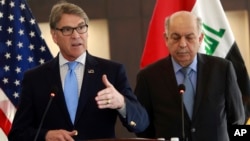U.S. Energy Secretary Rick Perry said Tuesday Iraq should partner with American companies to become energy independent, as Baghdad's waiver from US sanctions on Iran nears its expiry.
He spoke during a visit by the largest-ever U.S. trade delegation to Iraq for a two-day conference in Baghdad attended by more than 50 companies, most linked to petrol or security.
"Working together, the U.S. and Iraq can develop Iraq's oil, gas and water industries," Perry told those gathered.
"The time has come for Iraq to break its dependence... on less reliable nations seeking domination and control," he said, in an apparent reference to US foe Iran.
Iraq imports vast amounts of gas and electricity from Iran.
When Washington reimposed tough sanctions on Tehran's energy sector last month, it gave Iraq a 45-day waiver to plan how it would stop depending on Iranian electricity.
Perry on Tuesday said he discussed sanctions with Iraqi Oil Minister Thamer al-Ghadban and Electricity Minister Luay al-Khateeb, but did not say whether Baghdad would receive an extension to the waiver which ends next week.
Iraq this week is marking one year since it declared victory against the Islamic State group, whose sweep across swathes of the country prompted foreign firms to withdraw.
But since IS was rolled back and Iraq held parliamentary elections in May, the U.S. embassy in Baghdad has energetically pushed American companies to invest in Iraq, and the Iraqi government to open doors for them.
The embassy published a video this week insisting America should be "Iraq's economic partner of choice."
Red tape
Steve Lutes of the U.S. Chamber of Commerce, which organized the gathering, said its goal "is to show American companies that Iraq is open for business."
But despite improved security, investors said they were apprehensive about endemic corruption and bureaucracy -- issues that predate IS.
Iraq is the 12th most corrupt country in the world, according to Transparency International, and embezzlement of public goods is a deeply rooted problem.
"Security-wise, I'm not as concerned as I am about the red tape, things not moving, and to a certain degree about corruption," said attendee Mohammad Hussein, whose Texas-based tech company FTS Solutions is looking into Iraq's education and oil sectors.
Many attendees began operating in Iraq after the U.S.-led invasion in 2003.
Among them was the Contellis group, which includes Academi, formerly known as Blackwater.
Blackwater was banned from Iraq after four of its employees were accused of killing 14 civilians in Baghdad.




